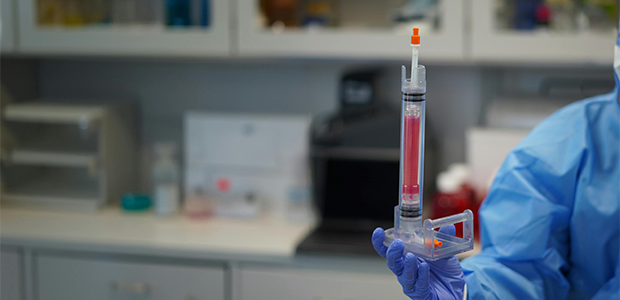
CSEM and ClexBio create a bioreactor for tissue-engineered cardiovascular implants
CSEM and ClexBio, a Nordic startup specialising in regenerative medicine, have developed an innovative bioreactor capable of cultivating human veins in the laboratory.
This project, supported by the Research Council of Norway, aims to offer a groundbreaking solution for individuals suffering from chronic venous insufficiency (CVI) by supplying bio-engineered vein implants.
The collaborative effort has led to the creation and testing of a bioreactor prototype designed to produce functional vein implants from stem-cell-derived human tissue. These implants are intended to integrate seamlessly into the patient's body, transforming into living tissue. ClexBio brought its expertise in regenerative medicine and hydrogels to the partnership, while CSEM contributed its knowledge in automation, micro physiological systems, and smart labware.
ClexBio's VivoSet technology offers a novel approach to tissue engineering, enabling the molding and creation of complex tissue structures like veins. This process involves mixing normal cells with ClexBio's proprietary biomaterial in a microfluidic setup. After the tissue forms, the cellular and scaffold components are removed, leaving an implant made solely of human extracellular matrix, mirroring the composition of natural tissues. The end product is a tissue-engineered vein graft ready for off-the-shelf implantation.
CSEM, a Swiss centre for technological innovation, specialises in developing standardised tissue engineering platforms. Their engineers worked alongside ClexBio to design a bioreactor that efficiently produces these implants on a larger scale. The device mimics the tubular structure of veins, essential for circulating blood back to the heart. Through the use of scaffolds, biocompatible membranes, and 3D printing technologies, they were able to fabricate vein-like tubes measuring approximately 10 cm in length and 1 cm in diameter.
Early pre-clinical trials by ClexBio indicate that these implants do not cause an immune reaction post-implantation. Instead, they are gradually inhabited by the patient's own cells, evolving into functional tissues that not only integrate with but also grow alongside the patient's body. This represents a significant advancement in regenerative medicine, with the potential to redefine treatment options for patients with CVI.
The Supervene project aimed to develop standardized, automated fabrication processes for regenerative medicine, moving from the lab bench to a clinical setting. “VivoSet is a new technology that can unlock the incredible potential of novel cell therapies”, states Stéphanie Boder-Pasche, Senior Project Manager in Cell Microtechnologies at CSEM. Her colleague Gilles Weder, Head of Research & BD in Life Science Technologies at CSEM, adds: “To produce such revolutionary implants, we need a closed, high-tech bio-manufacturing system that can operate automatically”. The veins are matured over a few weeks in a sterile environment, with automated media circulation for oxygen and nutrients supply. For Armend Håti, CEO & Co-Founder of ClexBio, this is a critical milestone: “Using a closed system to generate the vein grafts reduces the risk of contamination, ensures product quality and safety, and facilitates regulatory compliance. This is a vital prerequisite for our ability to conduct in-human studies and scale up commercially in a GMP setting in the future.”
Now that the system has been developed, ClexBio will conduct additional pre-clinical testing in larger animal models to generate data on the functionality of the bio-engineered vein implants in the cardiovascular system, including their ability to repopulate with the host’s own cells. “We are truly excited about the paradigm shift this may usher in for human surgery and the treatment of damaged tissues – we are moving away from a world of synthetic implants and stepping into the world of bioengineering" says Armend Håti.
Severe Chronic venous insufficiency (CVI) occurs when the valves in the veins of the legs don't work properly, leading to blood reflux and a build-up of blood in the veins. Afflicting millions of people around the world, this disease can lead to symptoms such as varicose veins, pain, swelling, edema, cramps, and recurring ulcers. Synthetic implants or stents have traditionally failed as they lead to thrombotic events in the venous system. Existing treatments range from compression stockings to symptomatic wound treatment, but to this date, there is no truly effective solution to address severe cases of CVI at the root.

